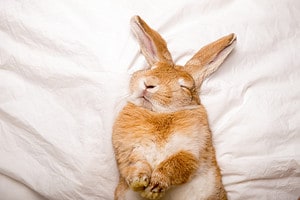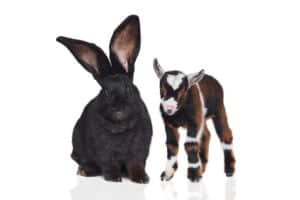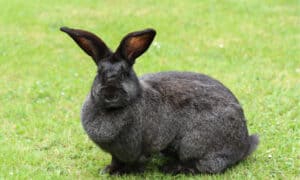Are you ready to bring home a new pet? Perhaps you started researching bunnies and fell in love with Lionhead rabbits. If so, that’s completely understandable. This breed is adorable and endearing. Who wouldn’t want to have one as a pet? But, like any pet, rabbits do require an investment in time and resources. We can’t necessarily help you with the former. However, we can help you better understand how much one of these lovely bunnies may cost you. Here are Lionhead rabbit prices for 2024, along with a breakdown of all the supplies and additional resources you may want to consider.
What Are Lionhead Rabbits?
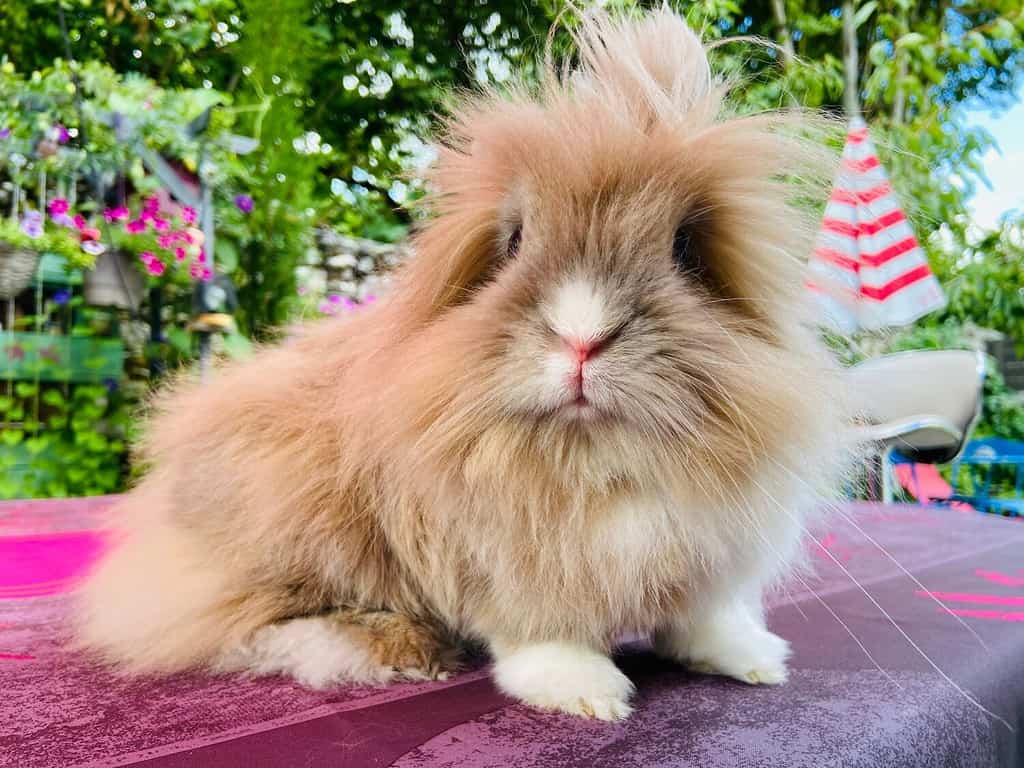
Lionhead rabbits have a remarkable appearance, thanks to their thick mane of fur.
©KanphotoSS/Shutterstock.com
Lionhead rabbits get their name thanks to the wooly and long fur growing around their head. They come from the cross-breeding of Netherland Dwarf and Swiss Fox rabbits in Belgium and France. They didn’t arrive in the United States until the 1990s. Even then, it was not an officially recognized breed for many years.
In 2013, the American Rabbit Breeders Association (ARBA) recognized Lionhead rabbits as an official breed. You can find two different varieties of Lionhead rabbits. The first is called single maned, which means they have less of a mane around their heads. It may even reduce over time. The second is called double maned. These rabbits don’t ever see a reduction in their mane. Some of them even have longer fur around their legs.
If you want to bring a Lionhead rabbit home, you will want to know its average life expectancy. That will give you a better idea about how much of an investment you are looking at (and how attached you can get). These fascinating rabbits will stick around for the long haul. Their life expectancy ranges from 7 to 9 years. So, you can have a friend for a while. And we don’t use the term “friend” lightly. Lionhead rabbits are typically very loving animals. They enjoy attention from their humans and can form significant bonds with their owners. They’re even fantastic with children and other pets.
How Big Are Lionhead Rabbits?
One of the determining factors about what you need to purchase for your rabbit is its size. Bigger rabbits naturally require more space and typically eat more food. Thankfully, Lionhead rabbits are not large. They average 2.5 to 3.75 pounds and 8 to 10 inches in length at maturity. Their short ears, high head, and compact body make them very distinctive.
Purchase Cost
Lionhead rabbits are relatively inexpensive pets (around $20) or expensive pets (up to $125). It all depends on whether you pick one up from a local pet store or rescue mission or buy one from a breeder. The latter is more expensive since pedigreed rabbits take time and money to raise. However, it is the better option if you want to raise your rabbits for show or to breed. Choose the quality of rabbit you want and then find a reputable seller.
You may also consider bringing home at least two rabbits. These are social animals, so a single rabbit may get lonely.
Overall Cost
Even though there are significant variables in owning a Lionhead rabbit, the first year will require the highest investment. That is because it includes the cost of new gear and supplies, which we’ll cover below. Expect the first year to range from $300 to $825 just to buy your rabbit and necessary supplies. Subsequent years will be more cost-effective since those initial purchases are no longer necessary. The monthly cost to care for your rabbit can be as low as $90 or as much as over $400 (when vet visits are required).
Next, we break down all the components that factor into this investment.
Supplies
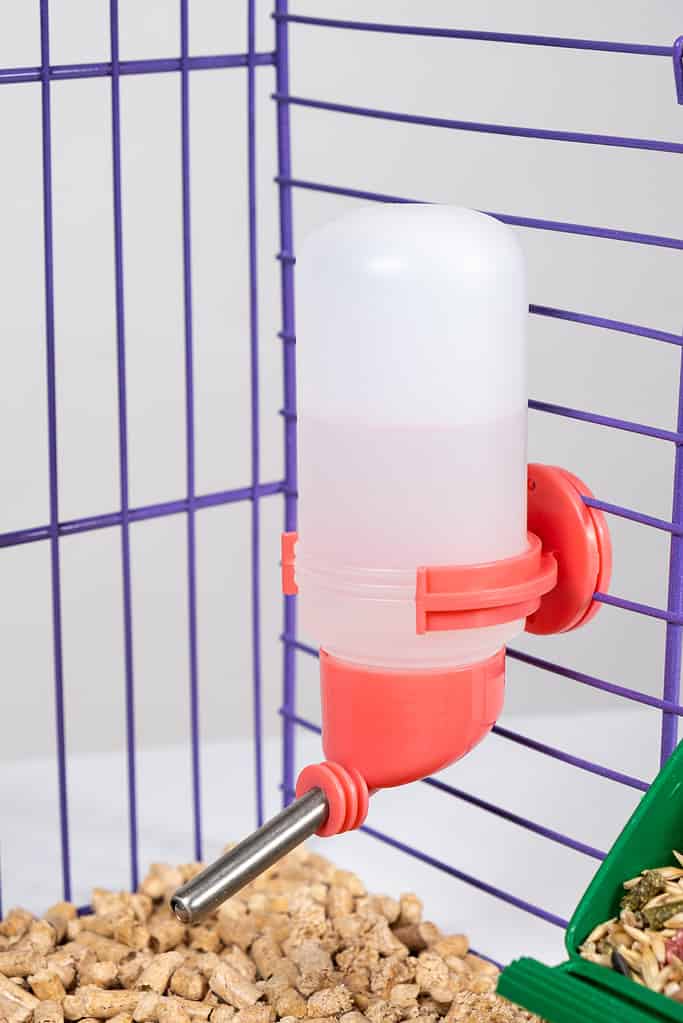
Your rabbit will need a cage, food bowl, and water bottle to start, so plan for these in your budget.
©Zarina Lukash/ via Getty Images
The primary supply you want to have on hand before you bring home your Lionhead rabbit is a cage. The good news is that these rabbits aren’t as big as other breeds. So, you can get away with purchasing a slightly smaller cage. But be careful. The last thing you want is for your new pet to suffer without enough legroom. Find a cage that is 18 x 24 inches (at minimum). This size is for a single rabbit. More than one animal will mean the cage size needs to be larger. Overall, you are looking at roughly $100 to $200. The cage will also need bedding and some blankets since rabbits like to snuggle. Those will run you around $40. But keep in mind the bedding is going to be an ongoing cost.
We’ll cover food below. However, you will need a place to put it. Find a decently sized food bowl for your rabbit’s cage and a water bottle. Water bowls are available, but those can leave a serious mess you’ll need to clean up regularly. Plan on $15 to $20 for the two.
While no animal “needs” toys, they certainly do make life more fun. Feel free to add whatever items catch your fancy. A single toy will run at least $5, so use your discretion here.
And if you want to bring your rabbit anywhere (like the vet), you need to invest in a carrier, which runs around $30.
Food
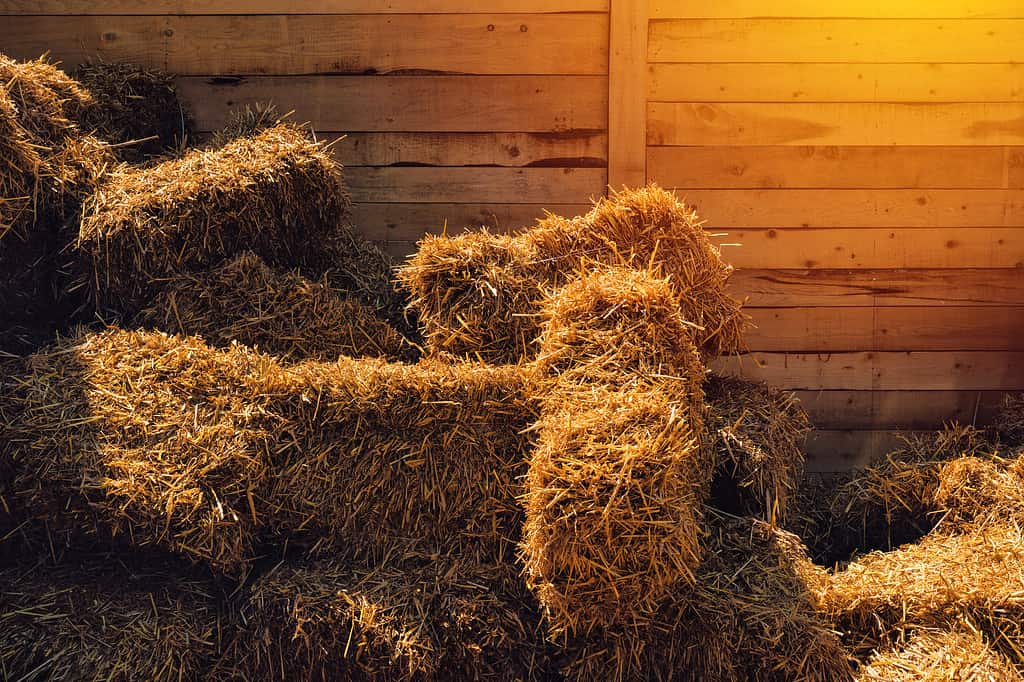
Lionhead rabbits love hay, so you need to keep a steady supply. Don’t worry, you can get smaller amounts than the bales pictured!
©stevanovicigor/ via Getty Images
The primary food item to always have on hand is hay. Lionhead rabbits should eat the equivalent of their weight in hay daily. But that’s not all they eat. They should also get fresh pellets every day. Since Lioneads are of smaller size, they won’t eat as many pellets as some other rabbits. Expect to pay roughly $18 to $50 monthly.
An additional cost consideration is the amount of fresh vegetables your rabbit will need. Most rabbits can consume a cup or more of fresh veggies daily. While you may think greens (which they love), other options include bell peppers, zucchini, and more. So, that will need to be added to your regular grocery budget.
Additional Considerations
While chew toys don’t technically fall under the food category, that doesn’t make them less important. Lionhead rabbits can easily suffer from overgrown teeth. Serious health complications can arise without a proper outlet for chewing to reduce their tooth length. Keep a ready supply of munchy items for your pet. The cost for this will vary dramatically and depend on your personal preference, but expect to pay at least $15.
Regardless of whether you purchase a single maned or double maned Lionhead rabbit, they will require regular grooming. Since they have extra fur, you will need the proper grooming tools for them. Don’t forget to include nail clippers in your grooming kit. Thankfully, these items cost a little less. You can get away with only spending $30 or less on the essentials.
Purchasing pet insurance is a wise choice since Lionhead rabbits are prone to health issues. They can easily develop digestive and dental problems as they age. Having a good pet insurance policy and a local vet you trust will make all the difference in the world. However, they are an additional investment. The cost for these items will vary based on the insurance level you want and what your vet charges. You can ask them for more details when you bring your rabbit in for vaccinations and to be spayed or neutered. These initial procedures will run you between $150 and $350.
The photo featured at the top of this post is © Oksana_Schmidt/Shutterstock.com
Thank you for reading! Have some feedback for us? Contact the AZ Animals editorial team.




